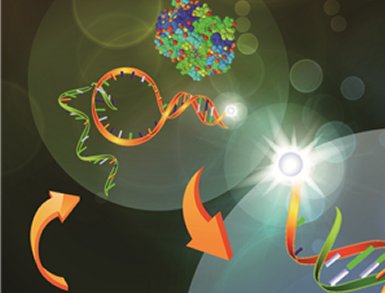Molecular beacons (MBs) are generally hairpin-structured probes and widely used for the sensitive and selective detection of DNA and RNA targets. One major limitation of MB design and preparation is the unquenched high background signal from the probe itself, which leads to poor sensitivity.
![]()
Chaoyong James Yang and co-workers, Xiamen University, China, have developed a new type of probe called an allosteric molecular beacon (orange ribbon in the picture). The probe can bind to streptavidin (sphere with colored dots) only when it is activated by its target (green ribbon). The streptavidin microbeads gather target-bound probes on the surface which allows them to be easily separated from free probes and other species for sensitive target detection in complex biological samples. The detection limits for the analysis of these analytes are far better than the values observed using other optical or electrical sensors.
The unique properties of the allosteric MBs will enable the development of a new class of probes for ultrasensitive biomedical diagnosis in complex biological solutions.
- Allosteric Molecular Beacons for Sensitive Detection of Nucleic Acids, Proteins, and Small Molecules in Complex Biological Samples
Y. Song, L. Cui, J. Wu, W. Zhang, W. Y. Zhang, H. Kang, C. J. Yang,
Chem. Eur. J. 2011, 17(33), 9042–9046.
DOI: 10.1002/chem.201101353




